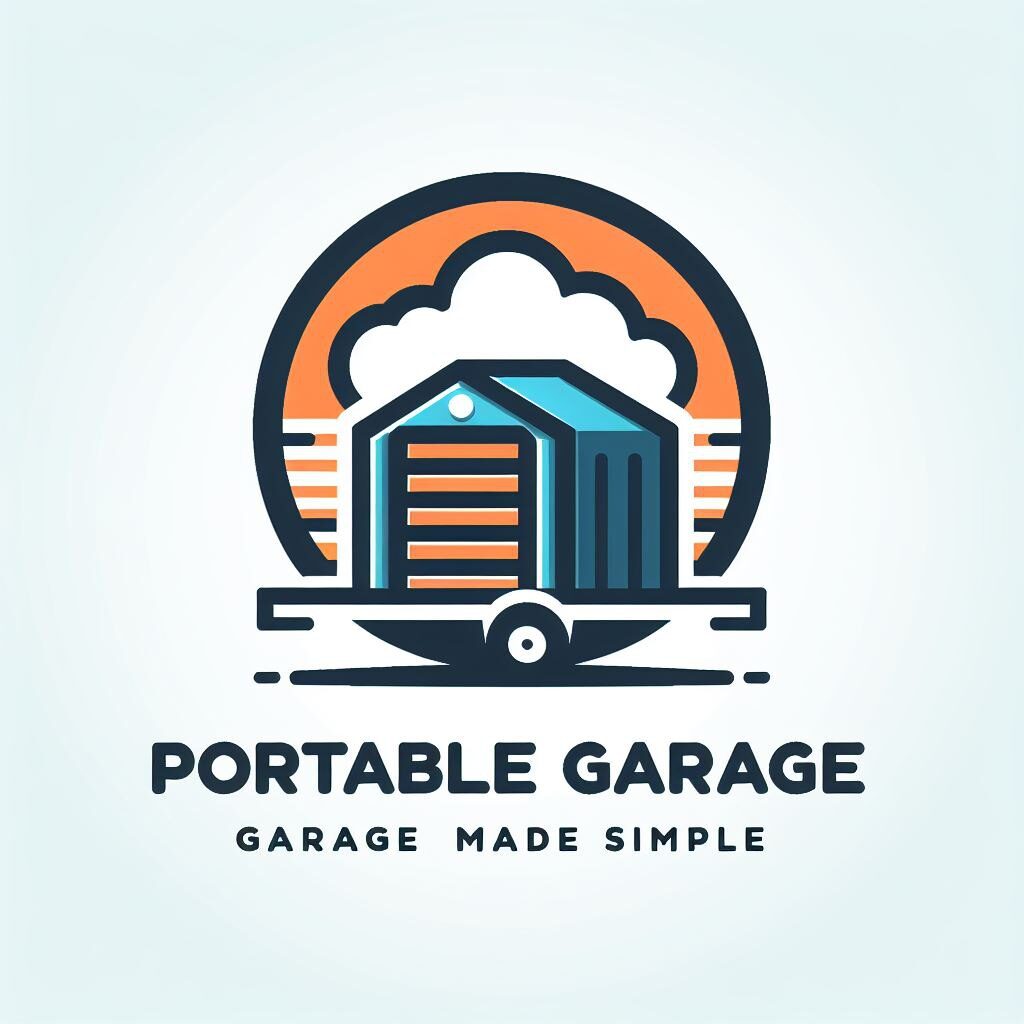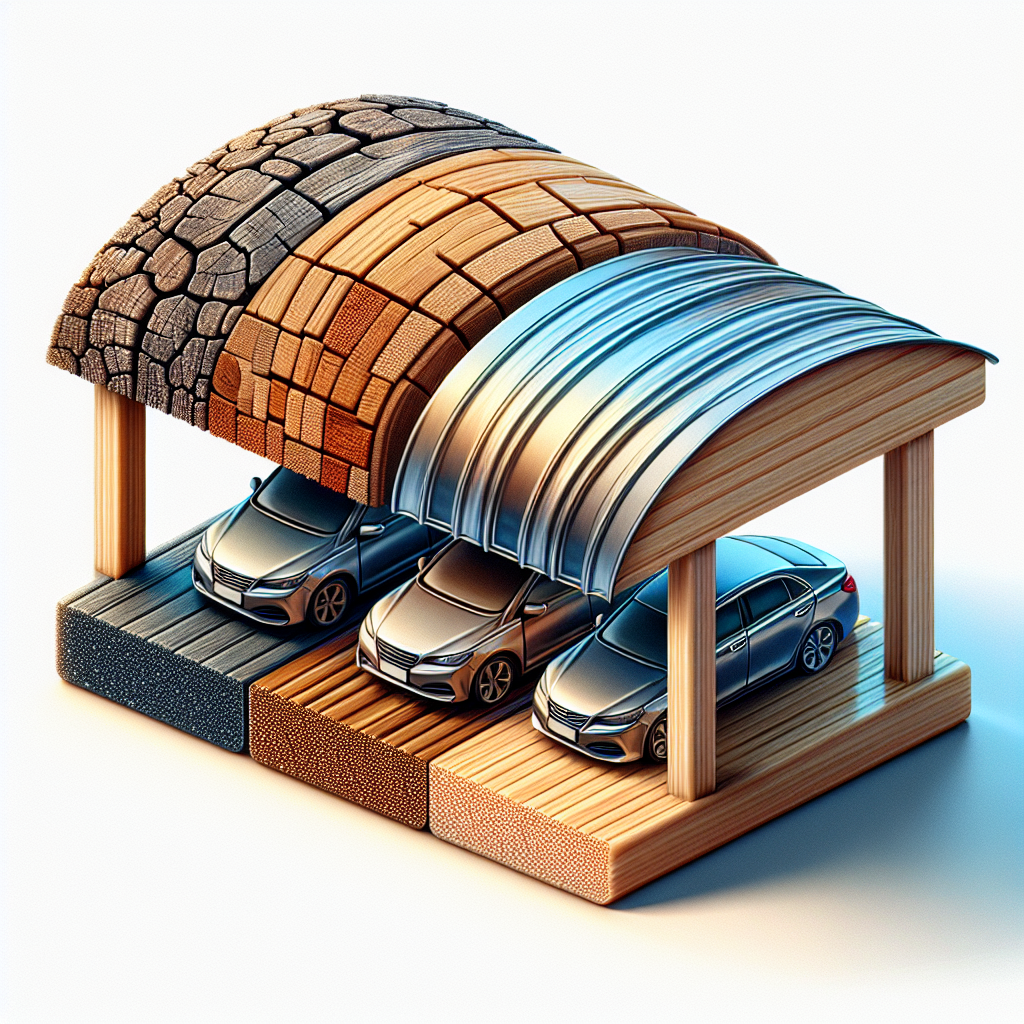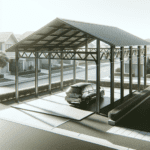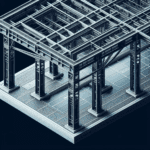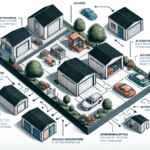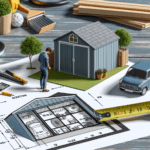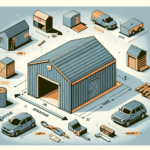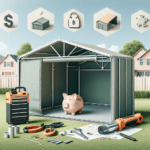Are you in the market for a new carport but not sure which material is best suited for your needs? Look no further! In this article, we will address some frequently asked questions about choosing the right carport material. Whether you’re concerned about durability, cost-effectiveness, or aesthetics, we’ve got you covered. Read on to find answers to all your burning questions and make an informed decision for your carport project.
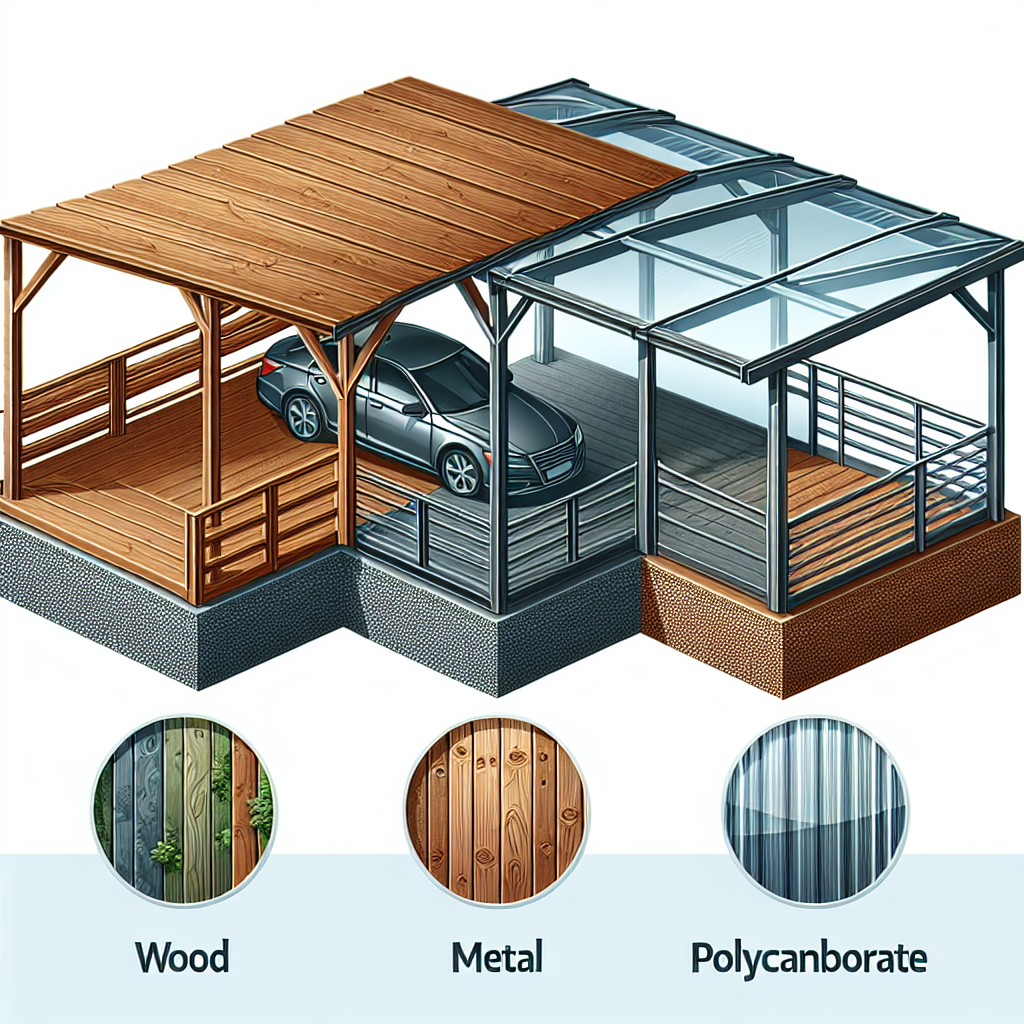
Types of Carport Materials
When it comes to choosing a carport material, there are several options to consider. The most common types of carport materials are metal, wood, aluminum, and vinyl. Each of these materials has its own set of advantages and disadvantages, and it’s important to understand them before making a decision.
Factors to Consider
Before diving into the specific types of carport materials, there are a few key factors to consider. These factors include durability, cost, maintenance, and aesthetics. By evaluating each of these factors, you can make an informed decision about which carport material is best suited for your needs.
Metal Carports
Metal carports are known for their durability and strength. They are often made from steel or aluminum and can withstand harsh weather conditions and heavy snow loads. Metal carports are also fire-resistant, making them a safe option for protecting your vehicles.
Advantages of metal carports include their longevity and low-maintenance nature. They typically require minimal upkeep and are resistant to rot, pests, and UV radiation. Furthermore, metal carports can be easily customized to fit your specific needs and can be installed quickly.
However, there are a few disadvantages to consider when choosing a metal carport. One of the main drawbacks is that metal carports can be prone to rust if not properly maintained. They can also be more expensive than other materials, especially if high-quality materials are used.
Metal carports are popularly used for storing vehicles, RVs, boats, and even as outdoor workspaces or picnic shelters. To keep your metal carport in optimal condition, regular cleaning, including removing debris from the roof, is important. You should also inspect for any signs of rust or corrosion and address them promptly.
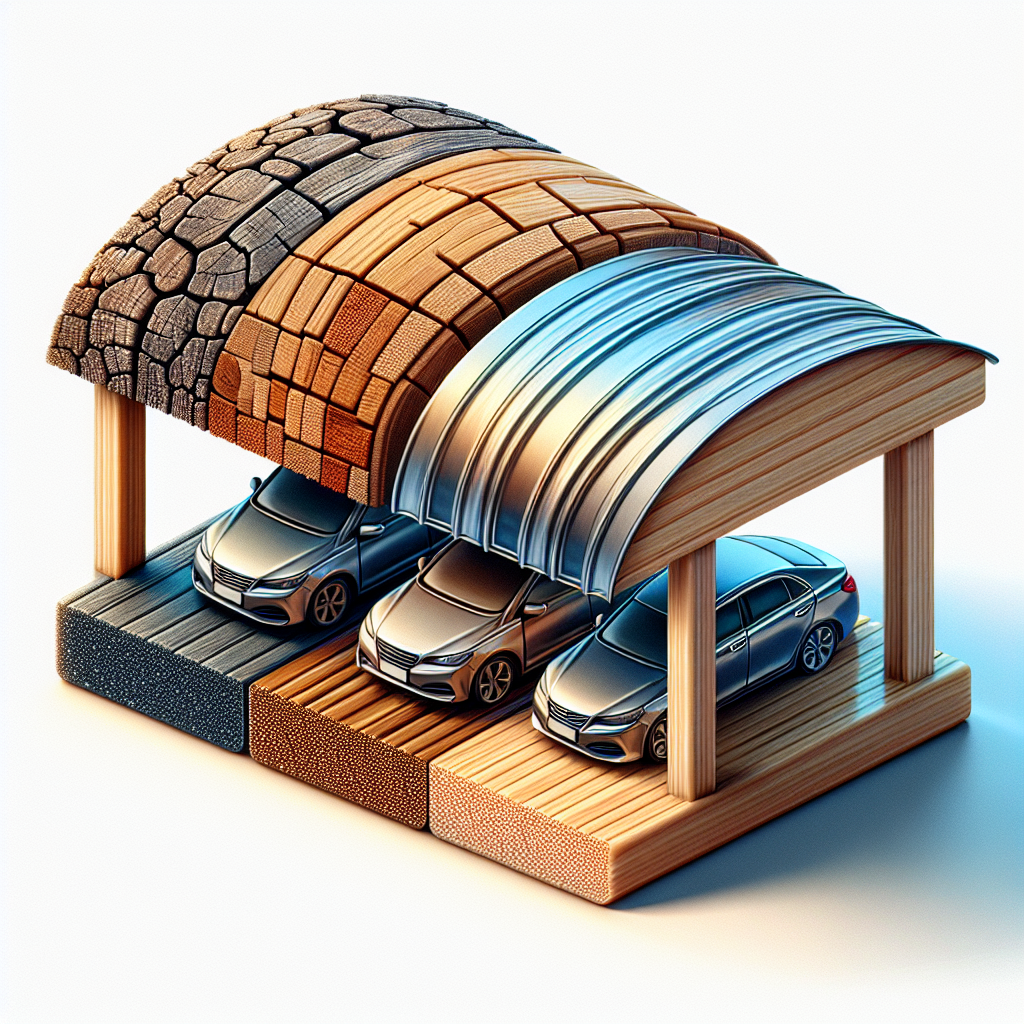
Wooden Carports
Wooden carports are a timeless and aesthetically pleasing option that can add a touch of elegance to your property. One of the main advantages of wooden carports is their natural beauty and ability to blend seamlessly with the surrounding landscape.
Wooden carports are often made from treated lumber or cedar, which makes them resistant to rot and insect damage. They are also known for their strength and durability, especially when properly maintained. Wooden carports can be easily customized and can be constructed to match the style of your home.
Despite their many advantages, wooden carports do have a few disadvantages. Wood is more susceptible to decay and moisture damage, which means regular maintenance is crucial to ensure their longevity. Additionally, wooden carports generally require more upkeep compared to other materials, including periodic repainting or staining.
Wooden carports are commonly used for additional outdoor storage, as a covered area for gatherings or parties, or as a shaded carport. To keep your wooden carport looking its best, regular cleaning and washing are important to remove dirt and debris. Repainting or staining every few years can also help protect the wood from moisture damage.
Aluminum Carports
Aluminum carports are a lightweight and versatile option that provides excellent protection for your vehicles. They are known for their durability and can withstand various weather conditions, including high winds and heavy rain. Aluminum carports are also resistant to rust and corrosion, making them a low-maintenance choice.
The advantages of aluminum carports include their lightweight nature, which makes them easy to install and relocate if needed. They are also more affordable compared to metal or wood carports, making them a cost-effective option. Aluminum carports are available in a wide range of designs and colors, allowing you to choose one that complements your home.
However, aluminum carports are not as strong as metal or wood carports, which means they may not be suitable for areas with heavy snow loads. Additionally, they may dent or scratch more easily compared to other materials.
Aluminum carports are popularly used for residential purposes, providing shade for vehicles, outdoor entertaining, or as a patio cover. To maintain your aluminum carport, regularly cleaning with mild soap and water is sufficient. Avoid using abrasive cleaners or brushes that can scratch the surface.
Vinyl Carports
Vinyl carports are a durable and low-maintenance option that can add both functionality and aesthetic appeal to your property. They are made from high-quality vinyl material that is resistant to moisture, rot, and pests. Vinyl carports are also available in various colors and styles, allowing you to find one that matches your preferences.
One of the main advantages of vinyl carports is their longevity. They are designed to withstand harsh weather conditions without fading, cracking, or warping. Vinyl carports are also easy to clean, requiring only a hose and mild detergent to remove dirt or stains.
However, vinyl carports can be more expensive compared to other materials, especially if you choose high-quality options. They may also not be as strong as metal or wood carports, which means they may not be suitable for heavy snow loads.
Vinyl carports are commonly used for protecting vehicles, boats, and recreational vehicles. They can also be used as covered outdoor storage or as shaded areas for outdoor activities. To maintain a vinyl carport, regular cleaning and occasional inspections for any signs of damage are recommended.
Comparing Different Materials
When it comes to choosing the right carport material for your needs, it’s important to compare the different options available. By evaluating factors such as durability and longevity, cost, maintenance requirements, and design options, you can make an informed decision.
Durability and Longevity
In terms of durability, metal carports are known for their strength and ability to withstand harsh weather conditions. They are resistant to rust and corrosion, making them a long-lasting option. Wooden carports are also durable but require regular maintenance to ensure their longevity. Aluminum and vinyl carports are more lightweight materials but are still designed to withstand various weather conditions.
Cost Analysis
When evaluating the cost of different carport materials, metal carports tend to be more expensive compared to other options, especially if high-quality materials are used. Wooden carports can also be costly initially, but they may require more maintenance over time. Aluminum and vinyl carports are generally more affordable and offer a good balance between cost and durability.
Maintenance Requirements
In terms of maintenance, metal carports require minimal upkeep and are easy to clean. Wooden carports, on the other hand, may require periodic repainting or staining to protect against moisture damage. Aluminum and vinyl carports are low-maintenance options that only require regular cleaning to remove dirt or stains.
Design Options
All carport materials offer various design options to suit different aesthetic preferences. Metal carports can be customized to fit your specific needs and are available in a range of colors. Wooden carports provide a natural and elegant look that can be easily matched with the style of your home. Aluminum and vinyl carports come in different colors and styles, allowing you to find one that complements your property.
Understanding Durability
When evaluating the durability of carport materials, it’s important to consider factors such as weather resistance, corrosion resistance, and strength.
Weather Resistance
Metal carports are designed to withstand harsh weather conditions, including heavy rain, snow, and strong winds. They are also fire-resistant, providing an extra layer of protection for your vehicles. Wooden carports can also withstand various weather conditions but may require regular maintenance to prevent moisture damage. Aluminum and vinyl carports are weather-resistant and can handle most weather conditions.
Corrosion Resistance
Metal carports are resistant to rust and corrosion, especially if they are made from galvanized steel or aluminum. Wooden carports are treated with chemicals to enhance their resistance against rot and decay. Aluminum carports are naturally resistant to corrosion due to their oxide layer. Vinyl carports are not prone to rust or corrosion, making them a suitable option for humid or coastal areas.
Strength
Metal carports are known for their strength and can withstand heavy snow loads without collapsing. Wooden carports are also strong when properly maintained, but they may be more prone to damage from heavy snow or strong winds. Aluminum carports are lightweight but still offer decent strength and stability. Vinyl carports are built to be strong and can handle most normal weather conditions.
Evaluating Cost
When it comes to evaluating the cost of carport materials, there are a few key factors to consider: initial cost, life cycle cost, and return on investment.
Initial Cost
Metal carports tend to have a higher initial cost compared to other materials, especially if high-quality materials are used. Wooden carports can also be costly initially due to the price of lumber and installation. Aluminum and vinyl carports are generally more affordable options, making them a suitable choice for those on a tighter budget.
Life Cycle Cost
While the initial cost is important, it’s also essential to consider the life cycle cost of the carport material. Metal carports require minimal maintenance and have a long lifespan, which can result in lower overall costs in the long run. Wooden carports may require more maintenance and periodic repairs, which can add to their overall cost over time. Aluminum and vinyl carports have low maintenance requirements and can provide good value for their cost.
Return on Investment
Investing in a carport can add value to your property and provide a range of benefits. Metal carports, due to their durability and longevity, can provide a higher return on investment compared to other materials. Wooden carports can also add value and appeal to your property, but they may require more maintenance. Aluminum and vinyl carports offer a good balance between cost and return on investment.
Maintenance Considerations
Regardless of the carport material you choose, regular maintenance is necessary to ensure its longevity and functionality. Here are some maintenance tips for each type of carport material.
Cleaning and Washing
Regular cleaning is important to keep your carport looking its best and to prevent the buildup of dirt or debris. Metal carports can be easily cleaned with mild soap and water. Wooden carports may require more care, including regular washing and removal of leaves or tree sap. Aluminum and vinyl carports can be cleaned using a hose and mild detergent.
Repainting
Wooden carports may require periodic repainting or staining to protect against moisture damage and maintain their appearance. Metal carports may need touch-ups or repainting if signs of rust or corrosion appear. Aluminum and vinyl carports generally do not require repainting, as they are designed to retain their color and finish.
Rot and Pest Prevention
For wooden carports, it’s important to regularly inspect for signs of rot or termite damage. Applying a sealant or waterproofing product can help prevent moisture damage. Proper ventilation and regular inspections are also essential to prevent pest infestations.
By considering the durability, cost, maintenance, and aesthetic aspects of each carport material, you can choose the right one to meet your specific needs. Whether it’s a metal, wood, aluminum, or vinyl carport, each material offers its own unique advantages and drawbacks. With proper care and maintenance, your carport can serve as a reliable and functional addition to your property for years to come.
